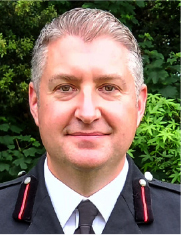Foreword
Last year, our crews responded to an average of 16 false alarms every day due to automatic fire alarms, placing an unnecessary burden on the Service’s resources and our ability to be ready and available for genuine emergencies.
An automatic fire alarm (AFA) automatically alerts people that smoke or fire is present in a building. Some alarms, commonly in domestic properties, sound to alert people in the vicinity, while others - more likely properties managed by businesses or occupied by people who are vulnerable - trigger a response from the fire service.
Similar to smoke alarms in homes, AFAs in businesses can raise an alarm when there isn’t an emergency, equivalent to when we burn the toast or when dust sets off the alarm.
In the last five years, we have been notified of more than 55,000 automatic fire alarms, out of which just 42 needed the hose reel jet from one of our fire engines, which is less than 0.08%. We’re looking to see how we can reduce the number of automatic fire alarms we attend to make our Service more efficient, and make sure our firefighters are able to respond to genuine emergencies.
This is an issue across fire and rescue services nationally and we have previously made changes in this area and currently do not respond to automatic fire alarms in some types of building unless there is a confirmed emergency between 8am and 6pm, Monday to Friday. This is because during these times, we expect someone at the premises or in the vicinity to call 999 should this be a real emergency.
This document sets out the reasons why we feel further change is needed and the options we are proposing to tackle the problem.
I’m aware that any change to fire response can make people feel unsettled. I want to be absolutely clear: any change is only to what we will do in response to an automatic alert and we will always attend if someone has reported a sign of fire.
We will also always attend domestic properties, such as houses, or where there is a known night-time sleeping risk.
The options we are presenting cover a number of areas of change that we are exploring. We have not made a decision or preference against any of these. We want to hear a broad range of views about these areas of change to inform our decision making. Please take time to look over the proposals and provide clear responses to the questions about how they might either positively or adversely affect you or someone you’re representing.
Gavin Ellis
Chief Fire Officer

